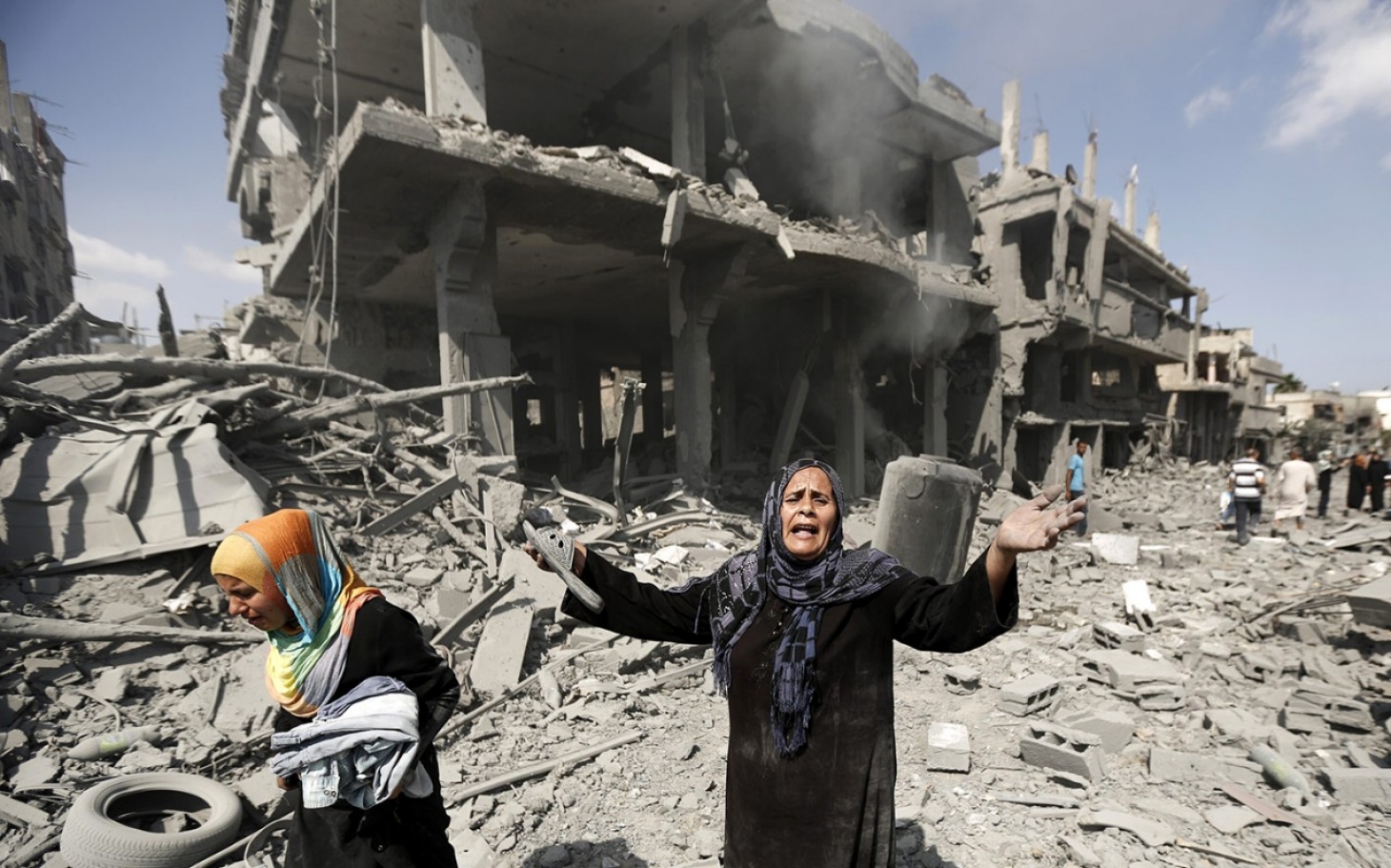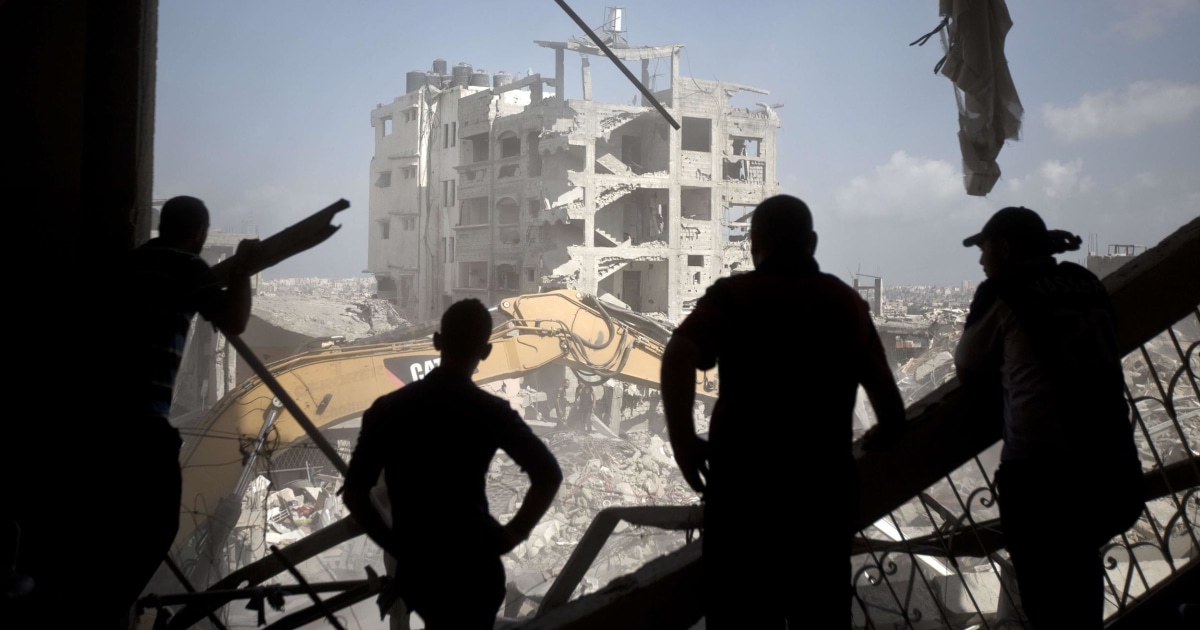
A Cease-Fire Can End the War on Civilians.
A “Humanitarian Pause” Will Not.
Branko Marcetic / Jacobin
(November 1, 2023) — As the Israeli government’s brutal war on Gaza continues into its fourth week, the United Nations and most of the world’s governments, human rights organizations, aid groups, and antiwar protesters have coalesced around a single demand: an immediate cease-fire.
The Biden administration, on the other hand, is calling for something different.
A cease-fire “would simply consolidate what Hamas has been able to do and allow it to remain where it is,” Secretary of State Antony Blinken recently told the Senate Appropriations Committee. “We do believe that we have to consider things like humanitarian pauses.”
That idea, of establishing one or several “humanitarian pauses” in the fighting, has become the official White House position, since echoed by the rest of the Democratic Party, and even Vermont senator Bernie Sanders, who has stuck with the language in defiance of pressure from former staffers to explicitly call for a cease-fire.
It’s also the position of loyal Washington lapdogs like UK Labour Party leader Keir Starmer and hawkish German foreign minister Annalena Baerbock, and has become the consensus position of the entire EU, as each has shunted the idea of a cease-fire off to the side.
At first glance, it’s not clear why this should bother us. “Cease-fire,” “humanitarian pause” — don’t these phrases mean the same thing, just expressed in different words? At various times, both supporters of peace and ongoing war have certainly said they think so, arguing, alternatively, that a “pause” would allow desperately needed aid and safe refuge out of Gaza for civilians, or that it would allow Hamas to deviously and unacceptably get fat off the world’s generosity. Following Starmer’s lead, one Labour-aligned liberal columnist recently declared the idea an irrelevant “semantic roadblock.” It seems all sides agree then.
But this is a mistake. It’s true that a cease-fire is literally defined as a temporary halt in fighting. Yet it’s the Biden administration that came up with the humanitarian pause idea, has stubbornly pushed it in place of a cease-fire, and — more to the point — has been calling the shots here, both in terms of its pivotal political and military support for Israel’s war, and in defining the limits of how far governments like the UK and EU states can go in terms of pressuring Israel. So it’s worth understanding what they actually mean by humanitarian pause.

“Temporary localized humanitarian pauses” are not enough.
Not Just Semantics
US National Security Council spokesperson John Kirby has made clear that when the Biden administration talks about humanitarian pauses, it doesn’t mean an actual pause in the war, but the cessation of attacks in only some parts of Gaza — “temporary localized humanitarian pauses to allow aid to get to specific populations and maybe even to help with the evacuation of people that want to get out, move more to the south,” to use his own words.
As Kirby told a Palestinian reporter who had lost 160 of his own relatives to the Israeli assault in that same briefing, the White House wasn’t in favor a “general cease-fire,” but simply stoppages that are “long enough so that folks like your relatives and family members can get this incredibly needed humanitarian assistance and perhaps a way to get out.”
Kirby’s statement echoes the definition used by the United Nations itself, which says humanitarian pauses are “usually for a defined period and specific geographic area where the humanitarian activities are to be carried out.”
As others have noted, those “pauses” could, in practice, be mere hours, giving aid trucks just enough time to enter and distribute goods or for refugees trapped at border crossings to leave, only for bombing to swiftly restart again. It also means that those civilians who happen to be in the much larger swaths of Gaza that aren’t subject to these pauses would continue to suffer under Israeli bombing and shelling.
Not only is that hardly a meaningful respite for Palestinians who have been living under weeks of nonstop, ferocious bombardment, but by its own terms it could easily make the entire exercise pointless, aside from serving as a public relations exercise to assuage the guilt of states backing Israel and dampen momentum for peace. Case in point: just last week, the Israeli military bombed a Gaza bakery immediately after a shipment of UN-provided flour was delivered and unloaded, destroying both the aid and the people waiting to get it. (A fifth of UN-supported bakeries have been hit by airstrikes so far.)
A humanitarian pause would, presumably, also do nothing about the inhuman and illegal siege that Israel has imposed on Gaza — certainly not based on the European Council’s wording of its official call for a pause, which makes no mention of the blockade. This would simply compound the problem that’s existed throughout the war, which is that the amount of aid that’s able to enter the country — even if it wasn’t quickly incinerated by Israeli carpet bombing — is nowhere near enough to make up for the total choking off of food, water, and fuel that’s making Gaza unlivable.
At best, this would entail a rolling series of fleeting humanitarian pauses to constantly replenish the starving and dehydrated residents of Gaza as the Israeli war effort proceeds, however long it might take (Israeli officials have floated everything from a whole year to ten) — an absurd situation where the international community would effectively be keeping Gazans alive just long enough to be eventually slaughtered by Israel’s indiscriminate attacks.

Daily convoys of hundreds of trucks are needed to supply humanitarian aid.
But even this terrible hypothetical is unrealistic: the head of Turkish Red Crescent, a humanitarian organization, estimated it would take one hundred trucks coming into Gaza every day to adequately supply the population, something that’s obviously impossible within the framework of humanitarian pauses.
The counterargument would be that, as Kirby put it, Palestinians could use however long the pauses last to “get out” or “move more to the south.” But there are several problems with this. For one, not only has Israel already previously bombed what were meant to be safe passageways for Palestinians to evacuate as they were en route, it’s also consistently pummeled the south of Gaza more broadly, despite having repeatedly told Palestinians to head there because that’s where they would be safe. So without the kind of “general cease-fire” that Kirby and the White House explicitly oppose, there’s a good chance their humanitarian pauses would simply afford Palestinians the opportunity to simply evacuate to and wait to be bombed in a different location.
Worse, this would effectively be using what’s meant to be a “humanitarian” measure to facilitate a campaign of ethnic cleansing, which is what Israel’s evacuation order to Palestinians in north Gaza — and Israeli officials’ suggestions that they move entirely out of the territory and into neighboring Egypt — plainly is in practice. In fact, there is mounting evidence that, besides eradicating Hamas, clearing Gaza of its Palestinian population is precisely and deliberately the goal of Israel’s military operation.
Kirby can say that the US government wants Palestinians “to be able to go back home” and avoid a state of “permanent refuge from the country,” but this means as much as Kirby and other officials’ frequent insistence that Israel abide by the same international law it’s wantonly flouting. And if Israeli officials make good on their vow to turn Gaza into “a city of tents” with “no buildings” left, which they are so far doing before the territory’s even been evacuated, then what exactly will there be left for Gazans to return to?

A Real Path to Peace
There’s one final crucial element. Generally, cease-fires aren’t simply about ceasing fighting, but about advancing or serving as a part of a broader political process — dialogue and negotiation, in other words, ideally leading to a long-term political settlement. Humanitarian pauses are not.
A cease-fire is the only one of these two options that has the potential to produce a peaceful, nonviolent solution to the current conflict, because it’s the only one that treats such a solution as an actual goal. Pro-Israel hawks are very honest about the fact that that’s why they oppose a cease-fire: because their aim is not to reach a state of peace, but to militarily obliterate Hamas, no matter the civilian toll, and regardless of whether that goal is actually feasible or of the risks of a wider, more catastrophic war breaking out in the process.
It’s really very simple: cease-fires exist to facilitate dialogue and eventual peace; humanitarian pauses exist to facilitate continued fighting, and in this case, they will very likely end up as instruments for advancing a campaign of ethnic cleansing and other war crimes. If you want an end to the war and to stop the loss of more innocent lives, the only serious position is a cease-fire.
Posted in accordance with Title 17, Section 107, US Code, for noncommercial, educational purposes.